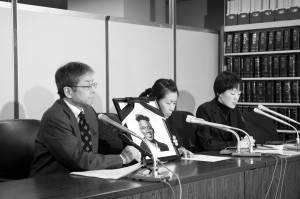On March 22nd at 3:31 PM, Mr. ABUBAKAR AWADU SURAJ (from Ghana), and APFS supportee, went lump aboard the plane at Narita Airport which he was forced to board by the Tokyo Immigration Office, an agency of the Ministry of Justice. He was delivered to the hospital of the airport, where he died. It happened while the Immigration Office tried to deport him.
The officers of the Narita Branch of the Tokyo Immigration Bureau restrained Mr. Suraj. That was when he lost consciousness. It is clear that handcuffs and towels were used as restraints.
Together with Mr. Suraj’s widow, APFS petitioned a protest to the Ministry of Justice on March 25th (Thu). The Ministry keeps repeating only that “the police is investigating”, but there was neither satisfactory explanation, nor any form of apology towards the family. We wonder what the lives of human beings mean to the Ministry of Justice. We demand a throughout explanation and an apology by Ms. Keiko CHIBA, Minister of Justice.
※A letter by Mr. Suraj to his wife is uploaded to the APFS blog. It shows his gentle character. It can be viewed from here.
Below follows the protest statement that we submitted to the Ministry of Justice.
March 25th, 2010
To: Ms. Keiko Chiba, Minister of Justice
From: ASIAN PEOPLE’S FRIENDSHIP SOCIETY (A. P. F. S.)
Protest Statement
On March 22nd, the atrocities committed by the officers of the Tokyo Immigration Bureau caused the death of Mr. ABUBAKAR AWADU SURAJ of Ghanaian nationality during his deportation. Regardless of the circumstances, we are strongly enraged by the fact that someone who was applying for residence died by the hand of immigration officers, who fundamentally should deport people in safety.
Mr. Suraj had a Japanese wife with whom he had been living together for many years and he was applying for the Special Permit for Residence. He had committed no crime apart from immigration violations, and had been living in Japanese society for twenty years as a good citizen. He felt deep remorse that his stay violated immigration regulations and he also wrote apology letters to the Immigration Bureau. Based on the “Guidelines on the Special Permit for Residence” set out last July, Mr. Suraj should have been granted the Special Permit. Yet, the Immigration Bureau still rejected his appeal.
Last May, Mr. Suraj was detained for the second time, but he refused to go home since he wanted to continue living with his beloved wife in Japan. In the process, his wife encountered mental stress and fell into an instable psychological state, in which it was difficult for her to live without the support of his husband, Mr. Suraj. Without the slightest understanding towards this situation, Chief Nagaoka and the whole management of the Tokyo Immigration Bureau mercilessly forced his deportation. Since last July, under Chief Nagaoka the detainment of applicants for refugee status and people still fighting in trial is common, and even such threats that they will detain mothers and children too if the husband does not agree to going home ‘voluntarily’ continue as well.
As we can see from these recent atrocities by the Tokyo Immigration Bureau management completely ignoring human rights, the death of Mr. Suraj is not a random incident, but rather something which was about to happen. If we think of the pain behind the case of Mr. Suraj, who had to die an unnatural death in a foreign land leaving his beloved wife behind, we feel not just sadness but rather enormous anger too towards the Tokyo Immigration Bureau. At the same time, the responsibility of the Ministry as well as the Minister of Justice is grave. While we strongly protest against this time’s outrage, we also demand an inquiry to reveal the truth to be able to prevent further incidents and the punishment of those who took part in the killing and those who were in charge.



